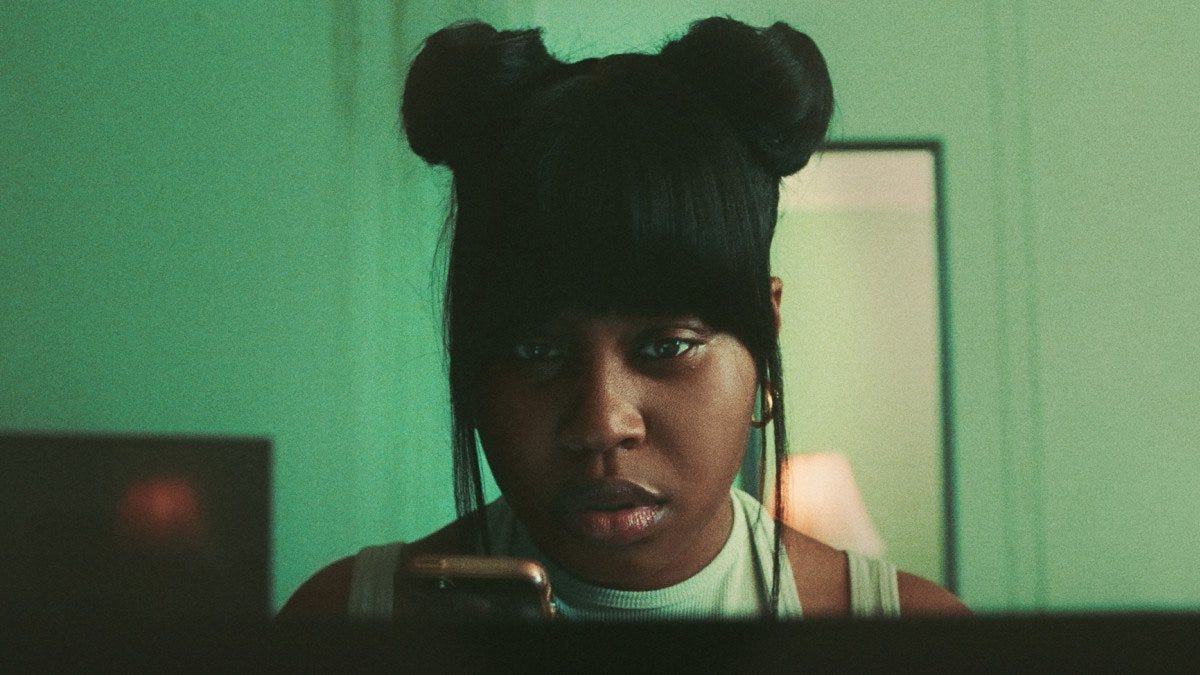Hi friends,
I’ve been wondering what are the elements of a fantastic satire on internet culture. I’m a fan of Ingrid Goes West, a huge Scream 4 apologist, and I’ve written about how Everything Everywhere All at Once tackles it as well.
Swarm takes a different approach. The new Prime Video series from Janine Nabers and Donald Glover is about Dre (Dominque Fishback), an obsessed Beyoncé — I mean Ni’Jah — stan. In each episode, Dre goes to a different city or state and kills someone who isn’t a Ni’Jah fan. It might be the first series to tackle stan culture head on. (Usually, I’d know for certain, but 550+ shows air every year now.)
Dre is enamored of Ni’Jah; she can do no wrong. Her music is incredible. Her performances are amazing. She’s won dozens of Grammys. Ni’Jah is Dre’s best friend — in Dre’s mind.
In a couple of ways, that’s the issue.
What too many internet satires fail to realize is how morphed communication online is. So many jokes and memes are a reference of a reference of a reference of a reference of something before it, like a constant game of telephone, to the point that you can’t always trace it back. I say this to say: communication online can be so post-post-ironic, that it can be easy to interpret it earnestly, but don’t be fooled.
When people post online, and maybe even more specifically when stans do, they might mean what they say — but they don’t necessarily mean how they say it.
I’m not sure many internet satires have fully grasped that concept. Maybe they never will. When you lift the way people speak on the internet out of online spaces and place it in real life, like Swarm does with Dre’s character right before she goes in for the kill, it sounds odd and over the top, of course. But in a way, it already is supposed to.
How to convey that berating another stan about how their favorite artist has won no Grammys carries the gravity of a “Yo momma” joke (which is to say none), but they’re being so serious about it too? It can’t be easy.
Sometimes communication online is all flair and no substance — a trap Swarm falls into with its own commentary.
I know some stans can be scary; some might even dox you. But most stans are scarier in numbers, something the ironically titled Swarm doesn’t show us. Dre acts alone.
Quickly you realize the stan commentary is really masquerading something else underneath, that Dre feels alone and rejected, that she’s able to project all the qualities she’s desired onto a pop star offering platitudes packaged as empowerment. Or maybe it’s the comfort of knowing you can never be rejected by someone who doesn’t know you even exist (till you bite her, of course).
Even then, we’re not left with much to chew on when it comes to Dre’s history, her motivations, or her relationship with her foster sister Marissa (Chloe Bailey). Often, the logic is unclear. And the show can feel off-beat for the sake of it. The aesthetics of the show hark back to Lemonade, Beyoncé’s album. Even every episode focusing on a different setting or story feel like a reference to the album, which often went from pop to R&B to rock to ballad from one song to the next. But these odd moments and maybe-references feel untethered to a purpose or any deeper meaning, or maybe the show runs out of something to say about an obsessed stan after just an episode or two.
The truth is, while some stans may think their favorite artist is their best friend, the more likely scenario is stans seeing their favorite artist as a content machine made only for them. Sure, some stans might be only infatuated with their favorite artist, but I think you’ll find they can often be downright pissed. Where is the single? Why are concert tickets $500? She should’ve released XYZ as the lead single! I hate her (somehow still complimentary) for releasing seven versions of her album!
The relationship is transactional. Artists offer a bastardized, elusive version of friendship. Stans hype them up, stream songs to the top of the charts, and pony up cash.
I won’t pretend I know all of the writers’ (including Malia Obama!) experience. But I’m unsure they’ve been fully entrenched into standom before. The stan who can see no flaws in their favorite artist can be fun to watch in a satire, just as Swarm is fun to watch on the surface, sure. But it’s the more complex, transactional relationship that offers the chance to unearth something truly twisted.
That need for stans to be in control of something, even a mega-famous pop star and her work, would have been quite the avenue to explore Dre’s trauma and anxieties.
Swarm is funny. Episode six is a personal favorite. I just wish that, underneath its off-kilter tone and approach, there would’ve been a bit more to it than the buzz.
My search for the next great internet satire continues.
Till next time,
Mike


You can’t quite capture the magic of the internet anywhere else!!